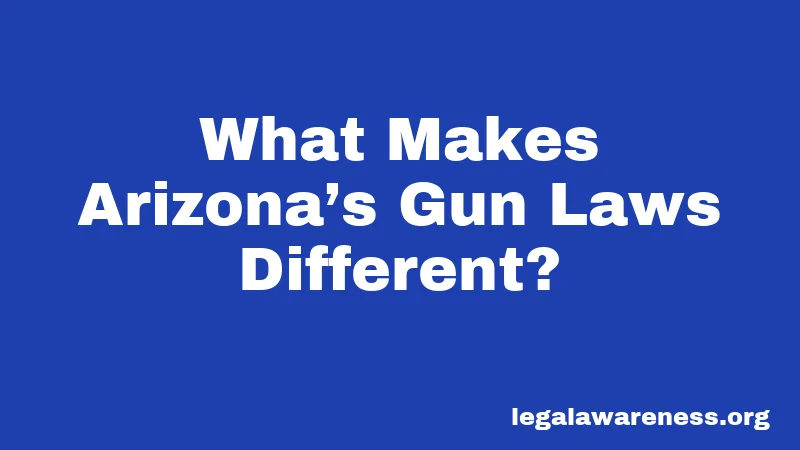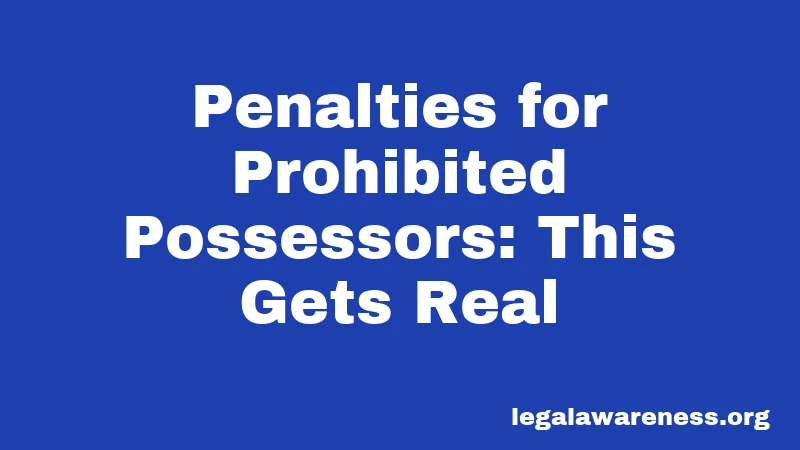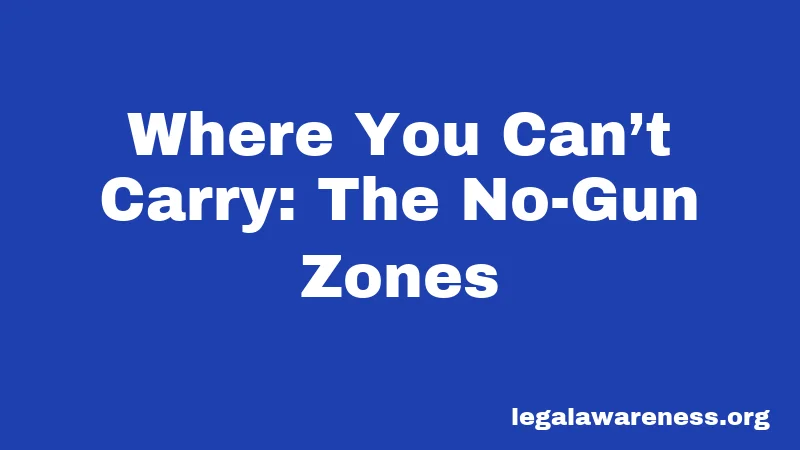Arizona Gun Laws in 2026: What You Actually Need to Know Right Now
You probably think you know Arizona’s gun laws. Honestly? Most people don’t. Arizona is famous for having some of the loosest gun regulations in the country. But here’s what surprises most folks: there are still serious rules you can break, and the penalties can be brutal. Let’s walk through exactly what you need to know to stay legal.
What Makes Arizona’s Gun Laws Different?

Arizona is basically the gun owner’s dream state. In 2010, the state made a big decision. It said you don’t need a permit to carry a concealed gun if you’re 21 or older. Pretty straightforward? It’s actually way more permissive than most states. But stay with me here—this doesn’t mean you can carry guns anywhere or sell them to anyone without limits.
Think of it like driving. You can drive without a license in your own backyard, but public roads? That’s different. Arizona’s gun laws work similarly. You have more freedom than other states, but there are still boundaries.
The Basics: Who Can Actually Own Guns in Arizona
First, the good news for most people. If you’re 18 and older and haven’t been convicted of a felony, you can own guns in Arizona. No permit needed. No registration. No waiting period. You just buy them.
But—and this is a big but—you can’t be a “prohibited possessor.” That’s lawyer-speak for people the law says can’t have guns. Let me break down who’s banned from owning firearms in Arizona.
Prohibited Possessors: Who Can’t Have Guns
Not sure if this applies to you? Here are the people Arizona law says can’t legally own or possess any gun:
Convicted Felons are the biggest group. If you were convicted of any felony—anywhere in the country—you can’t have a gun. It doesn’t matter if it was 5 years ago or 25 years ago. Unless your rights were restored, you’re out. The ban includes people currently serving prison time, probation, parole, or community supervision.
People with Domestic Violence Convictions face strict rules. If you were convicted of misdemeanor domestic violence, you can’t possess firearms. This is one people really do miss.
People Under Court Order are banned too. If a court found you were a danger to yourself or others, you’re prohibited. Same goes if you were found to be “persistently or acutely disabled or gravely disabled.” It sounds technical, but it basically means mental health decisions made by a judge.
People with Restraining Orders can’t have guns. If someone got a protective order against you for domestic violence, you’re prohibited. Period.
Minors can’t carry concealed weapons. But here’s the detail that matters: 18-year-olds can legally own and open carry guns. Concealed carry? That requires being 21 or older.
Illegal Drug Users are prohibited. If you’re an unlawful user of controlled substances, you can’t have guns. This includes federal law too.
Okay, pause. Read this carefully. If you match any of these categories, possessing a firearm is a serious crime. Let’s talk about what happens if you break this rule.
Penalties for Prohibited Possessors: This Gets Real

Here’s where it gets serious. If you’re a prohibited possessor and you get caught with a gun, you’re facing felony charges. Not just any felony. We’re talking significant prison time.
Possessing a firearm as a prohibited possessor is a Class 4 Felony in Arizona. That means you’re looking at 1 to 3.75 years in prison. The standard sentence is around 2.5 years, but judges can go higher. Your criminal record can push the sentence even further up.
Think of it like a traffic ticket, but way more serious. You could spend years in prison. You’ll have a felony on your record. You’ll lose employment opportunities. Some jobs become permanently closed to you. Housing becomes harder to find. Voting rights? You might lose those too.
It gets worse if you used the gun in another crime. Or if you sold a gun to someone you knew was prohibited. Those charges can jump to Class 3 Felonies, carrying sentences between 5 and 15 years. That’s basically a decade of your life, minimum.
Trust me, this is the part most people don’t realize how serious it is.
Carrying Guns in Arizona: The Permitless Carry Law
Now here’s what Arizona is famous for. You can carry a concealed handgun without a permit if you’re 21 or older and not a prohibited possessor. No background check. No training requirement. No waiting period. Just carry it.
Open carry? Even more relaxed. Anyone 18 and older who can legally own guns can openly carry. No permit. No age limit. Nothing.
Some people get an Arizona Concealed Weapons Permit anyway. Why? Because it makes buying guns easier. It helps with reciprocity if you travel to other states. And honestly, it gives you extra protection legally if something goes wrong.
If you want that permit, you’ll need to:
Take a state-approved firearms training course. There are tons of options. You can use online classes, in-person courses, hunter safety courses, or even NRA classes. Most take just a few hours.
Get fingerprinted and submit an application to the Arizona Department of Public Safety.
Pay a fee (usually around $50).
Wait about 30 to 45 days.
Your permit is valid for 5 years. Then you renew.
Where You Can’t Carry: The No-Gun Zones

Here’s where people really mess up. They legally own a gun, they have the right to carry it, and then they carry it somewhere that’s prohibited. Boom. Felony charge.
Arizona says no guns in these places:
School grounds (any K-12 school). Seriously, this one is important. Carrying on school property is a Class 1 Misdemeanor. But if you have a gun during certain crimes, it jumps to a Class 6 Felony. Don’t bring guns near schools, period.
Polling places on election day. You can’t carry a gun while voting.
Certain government buildings. This includes courthouses, some state offices, and the state capitol grounds.
Posted private establishments. If a business owner posts a sign saying “no weapons allowed,” you have to respect it. If you don’t, you could face trespassing or weapons charges.
Nuclear power plants and similar highly secure facilities.
Liquor stores that posted notices saying no guns allowed.
Universities and colleges can restrict guns in campus buildings, though Arizona doesn’t force this. Each school sets its own rules. And yes, guns are generally prohibited in student dormitories.
Airports (beyond certain checkpoints). Security areas are definitely off-limits.
Bars. If a place makes most of its money from alcohol sales, guns aren’t allowed.
Wondering if this applies to you? Check for signs at businesses. Call ahead if you’re not sure. When in doubt, don’t bring the gun.
Types of Guns and Weapons Arizona Restricts
Arizona doesn’t ban regular handguns or rifles. But some weapons are completely prohibited, no matter who you are.
Suppressors are banned. These are devices that muffle the sound of a gunshot. Even though federal law has a process to own them legally (you need an ATF tax stamp), Arizona state law still prohibits them. So you can’t use them here, even with federal approval.
Machine guns are illegal unless they were made before 1986 and registered with the feds. Regular people basically can’t have automatic weapons.
Sawed-off shotguns and sawed-off rifles are prohibited. If the barrel is less than 18 inches for a shotgun or less than 16 inches for a rifle, it’s illegal without proper federal registration.
Bombs, grenades, and explosives are obviously illegal.
Illegal homemade guns (sometimes called “ghost guns”) are technically legal in Arizona. But federal law is moving toward restrictions. This could change soon.
Possessing a prohibited weapon is typically a Class 4 Felony. That means 4 to 8 years in prison and fines up to $150,000. That’s not a joke.
Selling and Transferring Guns: The Rules You Might Miss
This is where a lot of confusion happens. Arizona lets private people sell guns to each other without a background check. But there are limits.
If you sell a gun to someone, you need to know they’re not a prohibited possessor. If you sell to someone you know (or have reason to know) is prohibited, you’re committing a crime. That’s a Class 6 Felony, carrying 1.5 to 3 years in prison.
You also can’t knowingly sell a gun to someone planning to commit a felony. If you do, you could face a Class 3 Felony charge with 5 to 15 years in prison.
Licensed gun dealers do background checks. Private sales don’t require them in Arizona. But you still can’t sell to obviously prohibited people. The law is basically: don’t sell to people you know are banned from having guns.
Recent Changes and What’s Coming
In 2025, Arizona lawmakers proposed some big changes. They wanted to decriminalize suppressors, make local gun laws harder to enforce, and allow guns on college campuses. Sound interesting? They actually passed all three bills. But Governor Katie Hobbs vetoed them in May 2025.
That means suppressors stay illegal. Preemption laws stay the same. Colleges can still ban guns if they want to.
What might come next? There’s talk about mandatory background checks for private sales. But nothing’s officially changed yet. Stay tuned—Arizona politics around guns move fast.
Restoring Your Gun Rights After a Felony
Okay, here’s the hopeful part. You don’t have to lose your gun rights forever.
If you were convicted of a non-serious felony, you can petition the court for a “set-aside” as soon as your case ends. A set-aside means your conviction still exists, but the court removes the penalties. And it automatically restores your gun rights.
For serious felonies, you have to wait. You can apply for firearm rights restoration two years after you’re released from prison or probation ends. But there’s no guarantee you’ll get approved.
Misdemeanor domestic violence is trickier. You have to get a set-aside to restore your rights. Courts don’t automatically do this.
Some people can also get pardons from the Governor. Or a Presidential pardon for federal crimes. These are rare, but they completely restore your rights.
The takeaway? Talk to a lawyer if you have a felony. You might be able to get your rights back.
Self-Defense Laws in Arizona
Arizona is a “Stand Your Ground” state. That means you don’t have to run away before defending yourself. If you’re in a place you have the legal right to be and you’re not doing anything illegal, you can use force—even deadly force—to protect yourself or someone else.
You can use deadly force when you reasonably believe it’s immediately necessary to stop unlawful deadly force.
You’re legally protected from civil lawsuits if your self-defense was justified.
You can defend someone else in the same way.
But here’s the catch: you have to reasonably believe the force was necessary. If a cop later disagrees, you could face charges. It’s not a free pass to hurt whoever you want.
Background Checks in Arizona
This trips people up. Arizona doesn’t require background checks for private gun sales. But licensed dealers must do background checks. Federal law requires it.
When you buy from a licensed dealer, they run a background check. It takes a few minutes to days. The check looks for felonies, restraining orders, and certain other prohibitions.
Private sales between two people? No background check required in Arizona. This is one reason Arizona has some of the loosest gun laws in the nation.
What If You Travel Out of State?
Arizona recognizes all other states’ concealed carry permits. If you have an Arizona permit, most other states honor it. But some states don’t. Check before you travel.
If you don’t have a permit and you’re relying on constitutional carry (permitless carry), be careful. Some states don’t allow that. You could illegally carry a concealed gun without knowing it.
When in doubt, get an Arizona permit. It’s your safest bet if you travel.
Firearms Safety and Accidents: Your Legal Responsibilities
You can actually face criminal charges for accidents. If you discharge a gun recklessly or negligently, you could be charged with reckless discharge.
Firing a gun into the air “just to celebrate”? That’s reckless discharge. Firing on your own property without checking what’s downrange? That’s negligent. Leaving a loaded gun where kids can access it? You could face serious charges if someone gets hurt.
Keep your guns stored safely. Unloaded. Locked up. Out of reach of kids. It’s not just responsible—it’s the law.
Frequently Asked Questions
Can I carry a gun in my car? Yes. You can carry openly or concealed in your vehicle without a permit. The gun can be loaded and ready to go.
Do I need to register my gun in Arizona? No. Arizona doesn’t require firearm registration. The government doesn’t track who owns what guns.
What if I’m traveling and have a gun? Make sure you know the laws of every state you’ll visit. Arizona is permissive, but most other states aren’t. Get an Arizona permit if you travel regularly. It provides reciprocity in many states.
Can I buy a gun online and have it shipped to me? Not directly. All firearms must be shipped to a licensed dealer. You pick it up from them after the background check clears.
What happens if I lie on a gun purchase form? That’s a federal felony. You could face up to 10 years in prison. It’s called “straw purchase” if you’re buying for someone else. Don’t do it.
If I have a felony set aside, can I own guns again? Yes. A set-aside restores your gun rights automatically. But you might still be prohibited under federal law if it was a federal felony.
Can gun rights be restored? Sometimes. Non-serious felonies can be set aside. Serious felonies require a court-ordered restoration after a waiting period. Talk to a lawyer about your specific case.
Final Thoughts
Arizona gun laws are permissive compared to most states. You can carry guns without permits. You can buy them without registration. Private sales don’t need background checks. It’s pretty straightforward.
But don’t let that fool you. Break the rules, and you’re facing serious felony charges. Prison time. A ruined record. Your life changes.
Know who’s prohibited. Know where you can’t carry. Know what weapons are illegal. Know the consequences. If you have questions about your specific situation, talk to a lawyer. It’s worth the money.
Now you know the basics. Stay informed, stay safe, and when in doubt, ask a lawyer or the Arizona Department of Public Safety.
References
Arizona Revised Statutes § 13-3101 – Prohibited Possessors
Arizona Revised Statutes § 13-3102 – Misconduct Involving Weapons
Arizona Revised Statutes § 13-3112 – Concealed Weapons Permit
Arizona Department of Public Safety – Concealed Weapons Permits
Giffords Law Center – Arizona Gun Laws
Everytown for Gun Safety – Arizona Gun Violence Statistics

very good recap of gun laws
Thank you